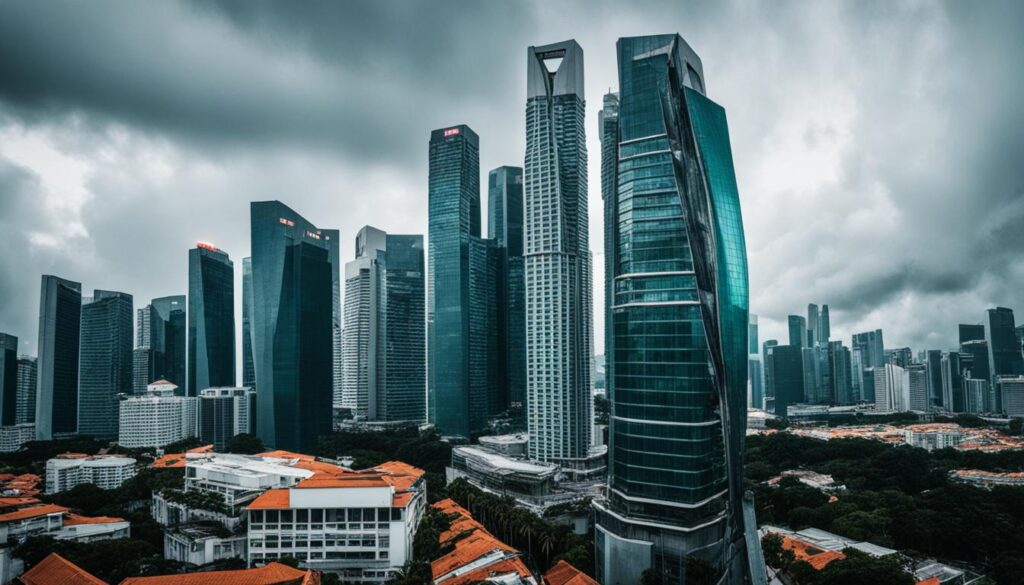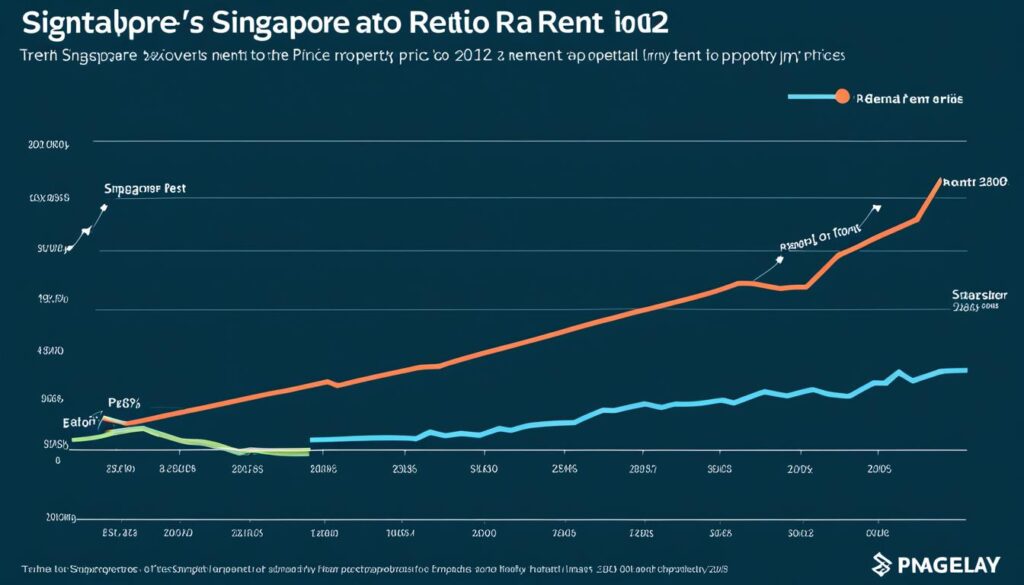As 2024 gets closer, people investing in property and those who own homes in Singapore are getting more alert. They are worried about the chance of a market crash. The signs are unclear right now. Some new buildings are finishing a lot of apartments.
Also, the starting prices for these places are hitting record levels. This situation makes people wonder if buying homes will keep being possible. How the government acts and the overall economy will play a big role in what happens next with housing.

Key Takeaways
- Investors and homeowners are concerned about a potential crash in the Singapore property market.
- Mixed signals are evident, with new developments completing many units and launch prices rising.
- Government policies and economic factors will significantly influence market stability.
- Affordability and sustainability are primary concerns amid rising lot prices.
- The 2024 property market outlook remains uncertain, requiring cautious attention.
Current Trends in the Singapore Property Market
The post-pandemic era has brought noticeable changes to Singapore’s property market. COVID-19, new projects, and government rules have combined to shape a unique market situation.
Price Rises and the Post-Pandemic Effect
After the pandemic, property prices in Singapore have jumped significantly. Developments like Normanton Park, Treasure at Tampines, and Parc Clematis are transforming the market. These projects are setting new standards for price and quality, making the market very attractive.
Cooling Measures Impact
In April 2023, the government brought in measures to cool down the hot market. The true impact of these Singapore cooling measures is still unfolding. To help with supply and demand, the government is finishing more HDB flats.
Developers are bidding more carefully on land, showing a more cautious approach to new projects. This shows the complex factors at play in Singapore’s property market today. It highlights the balance between keeping the market active and making homes affordable.
Recent Real Estate Market Forecasts
Several forecasts have painted a picture of the Singapore real estate market recently. Each one brings its own view on where the market might head. This information is vital for investors and homeowners to set their expectations.

Morgan Stanley’s Forecast
Morgan Stanley predicts a possible 3% drop in housing prices by 2024. Their cautious outlook comes from signs like more empty homes and changing sales numbers. Their findings are important, hinting at a real estate bubble in Singapore.
Local Analysts’ Predictions
Local experts, however, have a different take. They watch how government actions and the supply-demand balance affect the market. Their detailed predictions help us grasp the market’s direction, considering complex trends and external events.
Factors Impacting the Singapore Property Market
The Singapore property market is shaped by many factors. These are important for investors, homeowners, and policymakers to understand.
Interest Rates and Mortgage Rates
Interest rates have a big effect on mortgage rates. This can make home loans cheaper or more costly. With interest rates going up, mortgage rates may increase. This makes it harder for people to buy homes. It also puts pressure on the Singapore property market.
Government Policies and Cooling Measures
Government policies and cooling measures help stabilize the market. For example, tighter rules on loans and higher duties for buying multiple properties were introduced. These steps prevent too fast growth and real estate bubbles. They control demand and influence the market’s health.
Economic Performance and Employment Rates
The economy and jobs are key to the property market’s well-being. A strong economy and good job rates increase people’s interest in buying homes. On the other hand, if the economy struggles or jobs are lost, fewer people want to buy. This can lead to more empty homes.
It’s important to watch things like GDP growth and job stability. These help us foresee changes in the property market.
Here’s a summary of how these factors interplay:
| Factors | Impact on Market | Current Trends |
|---|---|---|
| Mortgage Rates | Affects buying capacity | Rising interest rates |
| Government Policies | Moderates demand | Stricter regulations |
| Economic Performance | Influences demand and supply | Steady growth |
| Employment Rates | Impacts consumer confidence | Stable employment |
Supply vs. Demand Analysis
The Singapore property market is facing a time of change. Supply levels shift as buyer demand stays strong. Understanding how future housing projects impact supply is key in this changing market.
Current Supply Situation
The housing market supply situation in Singapore is seeing more units. This includes BTO projects and big developments. These new units challenge the balance of supply and demand, shifting current supply levels.
Future Housing Projects
Many future housing projects are in the works. They will change market conditions. These new projects could balance supply and demand, offering buyers more choices. Watching how these developments affect the market is crucial.
Demand Trends Among Buyers
Buyer demand in Singapore remains high for several reasons. People moving from HDB flats, population growth, and investment opportunities fuel this demand. Recognizing what drives buyer interest is vital as the market shifts.

Understanding the link between supply, future projects, and demand is essential. It helps navigate the Singapore property market’s complexities.
New Launches and Market Reactions
New property launches in Singapore are grabbing everyone’s attention. Everyone wants to know how the market is reacting to launch prices. Places like AMO Residence and The Reserve Residences are often in the news. This is thanks to how they set their prices.
Recent Launch Prices
Prices for new properties in Singapore are on the rise. This trend is changing how people feel about the market. Knowing about the financial sides of these launches helps us see the big picture in real estate. As prices go up, it affects who can afford these places and their value as investments.
Buyers’ Sentiment and Response
People looking to buy homes have mixed feelings. For instance, HDB upgraders are cautious because of the high prices. On the other hand, some see the benefits of buying now despite the costs. They think about the long-term gains.
| Project Name | Launch Price (S$) | Buyer Sentiment |
|---|---|---|
| AMO Residence | 2,000,000 | Mixed |
| The Reserve Residences | 1,800,000 | Adaptable |
| Pasir Ris 8 | 1,500,000 | Positive |
Impact of Foreign Investment on Singapore Real Estate
Foreign investment is a big deal in Singapore’s real estate sector. The restrictions on foreign buyers play a large role. They are changing how investments work and the market itself.
Foreign Buyer Restrictions
Singapore has strict rules for foreign real estate investment. One example is the Additional Buyer’s Stamp Duty (ABSD) for outsiders. Its goal is to control foreign money flow and help locals afford homes despite price hikes.

The ABSD is key in discussions about foreign investment impacts. It started years ago to stop too much speculation by foreigners. It really matters in the high-end condo area.
Comparison with Hong Kong Market
Comparing Singapore and Hong Kong shows different approaches to foreign investment. Hong Kong uses different tax methods to manage its market. Yet, their structure and effects differ from Singapore’s.
| Factor | Singapore | Hong Kong |
|---|---|---|
| Primary Restriction | Additional Buyer’s Stamp Duty (ABSD) | Special Stamp Duty (SSD) |
| Target Audience | Foreign Buyers | Both Local and Foreign Buyers |
| Impact on Luxury Market | Significant | Moderate |
| Market Reaction | Stabilized Prices | Fluctuating Prices |
This comparison shows different tactics by Singapore and Hong Kong. The way investors and the real estate trends react offers insights. It shows how policies influence the markets.
Is Singapore Property Market Going to Crash?
Predicting a crash in the Singapore property market requires looking at many details. First, it’s vital to look at the price-to-rent and price-to-income ratios. These numbers show if the market is stable and if buying homes is feasible for people and investors.
Government policies also keep the market stable. They use regulations and taxes to avoid market overheating. The level of investment from both local and international sources also affects the market’s condition. This helps decide if a market drop might happen.
“The housing market’s stability often hinges on numerous interrelated factors, making definitive predictions challenging”—a real estate analyst.
Right now, the signs are mixed about the market’s future. Some evidence shows risks, while other signs show the market could stay strong. A detailed review of these elements is crucial to predict a market drop accurately.
| Key Factors | Impact on Market | Indicators |
|---|---|---|
| Price-to-Rent Ratio | Market Affordability | Moderate Stability |
| Government Regulations | Legislative Impact | Sustaining Balance |
| Investment Levels | Domestic and Foreign Influence | Mixed Signals |
Price-to-Rent and Price-to-Income Ratios
The property market in Singapore often looks at the price-to-rent and price-to-income ratios. These measures help us understand if homes are affordable and if the market can keep going strong.
Current Metrics Overview
Right now, Singapore’s price-to-rent ratio is in a moderate spot. This means that despite high costs, renting is still an option for many. The price-to-income ratio is also key for checking if homes are affordable. Though property costs have gone up, incomes are rising slower. Yet, there’s a careful balance here.

Long-Term Sustainability
The future of the market depends on these ratios staying steady. If property costs go up but rent and salaries don’t keep up, it could mean trouble for people trying to find affordable homes. Keeping a sustainable price-to-income ratio and a manageable price-to-rent range is vital for the market’s health.
The Role of Deferred Payment Schemes (DPS)
Deferred Payment Schemes (DPS) are changing the game in property sales. They bring much-needed flexibility to the Singapore real estate market. With DPS becoming more popular, developers are using it to reduce high inventory. They’re attracting more buyers too.
Why DPS is Gaining Popularity?
DPS’s popularity in real estate comes from how it helps buyers manage money. With DPS, people can buy a property without feeling the financial pinch right away. It makes owning a home easier. This is especially true when costs are high, and the market is competitive.
Developers’ Strategies
Developers use DPS to make their properties more attractive. By offering these plans, they reach more customers and sell more homes faster. This is key in places with lots of finished projects and many unsold homes. DPS also shows a developer believes in their project’s worth. This belief can draw in more investment.
| Benefits of DPS | Details |
|---|---|
| Financial Flexibility | Allows buyers to spread payment over a period, reducing immediate financial pressure. |
| Market Appeal | Makes properties more attractive to a broader range of buyers. |
| Accelerated Sales | Helps developers quickly sell off unsold units. |
| Credibility Boost | Reflects developer confidence in their projects, enhancing trustworthiness. |
Housing Prices Analysis: Past, Present, and Future
To understand housing prices in Singapore, look at past trends, current data, and future forecasts. This approach offers insights into where the market might be headed.
Historical Price Trends
Singapore’s property market has been up and down. The early 2000s saw prices jump, while the 2010s were more stable. These shifts show how the economy and policies affect the market.
Here’s a table showing how private home prices changed yearly from 2010 to 2020:
| Year | Average Price Change (%) |
|---|---|
| 2010 | 12.9 |
| 2011 | 5.2 |
| 2012 | 2.8 |
| 2013 | 2.2 |
| 2014 | -4.1 |
| 2015 | -3.7 |
| 2016 | -3.1 |
| 2017 | 1.1 |
| 2018 | 7.9 |
| 2019 | 2.7 |
| 2020 | 2.2 |
2024 Price Predictions
The 2024 forecast for Singapore’s housing market sees a few possible outcomes. Economic health, policy changes, and world markets will be key. Experts feel a balanced market might mean steady or slightly rising prices.
Keeping an eye on these trends is important for both investors and homebuyers. Singapore’s housing prices reflect shifts in the economy and policy.
Potential Real Estate Bubble in Singapore
Today, Singapore’s property market is rising fast. This brings up worries about a possible real estate bubble. It’s important to analyze signs to see if the market is heading into bubble territory. This helps us understand future stability.
Indicators of a Bubble
Signs of a real estate bubble include quick jumps in property values that beat economic growth. Another big sign is when housing prices grow much faster than rents and incomes. This shows the market might not sustain these conditions. This gap can lead to overpricing, increasing the chance of a market drop.
Comparison with Previous Bubbles
Comparing today’s market with past bubbles, like the early 1990s, gives us insight. Back then, fast increases in property values led to big downturns. This shows the ups and downs of property markets. Looking at these past bubbles helps stakeholders understand the risk of a bubble in Singapore now.
- Excessive luxury project launches without corresponding demand.
- Unexpected high property transactions and speculative investments.
- Disproportionately high property prices relative to median incomes.
- Significant increases in debt levels among property buyers.
- Governmental warnings and intervention signals to curb speculation.
Keeping an eye on these indicators is key. It tells us if current signs are like past bubbles or different.
The chance of a Singapore housing bubble is a hot topic. Still, knowing these signs and comparing them is crucial for navigating the property market.
Government Interventions and Future Projections
The government of Singapore is active in managing the real estate sector. It has made various efforts to keep the market stable and growing. These steps show its commitment to meet the needs of homeowners, investors, and the economy.
Possible Policy Changes
Expected policy updates in real estate could come as the market changes. These might include changes in stamp duties and loan rules, or new rules for buyers from other countries. The government designs every action to keep the property market strong.
Long-term Market Stability
The goal of policy updates is to ensure stability in the real estate market over a long period. Future actions by the government, along with adaptive measures, aim to handle shifts in market trends and external financial pressures. It’s vital for the housing market’s future to match the country’s broader economic objectives for ongoing success.
Here is a brief overview of significant government measures and their effects on the real estate market:
| Intervention | Objective | Impact |
|---|---|---|
| Additional Buyer’s Stamp Duty (ABSD) | Control foreign investment | Increased local ownership |
| Loan-to-Value (LTV) Ratio | Regulate borrowing limits | Enhanced financial prudence |
| Property Cooling Measures | Stabilize prices | Reduced speculative buying |
Conclusion
Many people are talking about the chance of a property market crash in Singapore in 2024. This discussion comes from price increases after the pandemic, strict government rules, and changing economic signs. This article has looked deeply into these issues.
Recent trends in real estate show both the good and the not-so-good. We see a lot of new building and high prices, which means activity is strong. But, more and more people are finding it hard to afford homes. The government is trying to help by imposing taxes, like the ABSD, which affects buying decisions.
The future of Singapore’s property market depends on many things. These include how the economy does, interest rates, the government’s policies, and what buyers want. While it’s hard to say exactly what will happen, it’s important to understand these trends. This article gives a detailed and useful look at what might be coming for this lively market.
FAQ
Is the Singapore property market heading for a downturn in 2024?
Investors and homeowners are keeping a close eye on the market as 2024 nears. The market’s future is hard to pinpoint with certainty. This is because of mixed signals from various indicators. High property prices, government cooling measures, and economic health will play a big role.
What current trends are we seeing in the Singapore property market?
Since the pandemic ended, Singapore’s property prices have jumped. Developments like Normanton Park and Treasure at Tampines are finishing many units. Cooling measures from April 2023 are starting to impact these rising prices. Yet, their full effects are still unknown.
What are the recent real estate market forecasts?
Morgan Stanley expects a 3% drop in housing prices in 2024. Experts advise watching market trends, government actions, and supply-demand carefully. Considering various forecasts is crucial because of differing views.
What factors are impacting the Singapore property market?
Many things are shaping the market. Interest rates, government policy, and the economy are key factors. Together, they affect how affordable properties are and the demand for them.
How does the supply and demand situation look in Singapore’s property market?
There are a lot of new developments being completed. The supply of housing is high right now. But, demand is also strong, fueled by HDB upgrades and investors.
How are new property launches affecting the market?
New project prices are going up, following current trends. This has led to mixed feelings among buyers. Some delay buying because of high costs, while others adjust to these new prices.
What is the impact of foreign investment on the Singapore real estate market?
Rules like the Additional Buyer’s Stamp Duty (ABSD) have changed foreign investment levels. Changes in Hong Kong’s tax policy might also redirect investments, especially in high-end homes.
Is the Singapore property market going to crash?
To predict a crash, several factors like price-to-rent and price-to-income ratios are analyzed. Government policies and investment trends are also considered. But current data offers mixed signals, making clear predictions hard.
What do the price-to-rent and price-to-income ratios indicate about the property market?
Current ratios show the market is not overvalued right now. But, it’s key to keep watching these metrics. They help us understand the market’s future direction.
Why are Deferred Payment Schemes (DPS) becoming popular?
Deferred Payment Schemes give buyers more flexibility financially. Developers are using these schemes to attract buyers in a market with many properties.
What can historical housing prices tell us about future trends?
Looking at past and present prices gives clues about the market’s path. Combining historical data with economic forecasts helps us guess what might happen in 2024.
Are there indicators of a real estate bubble in Singapore?
To see if there’s a bubble, experts watch for property prices rising faster than the economy. Comparing today’s market to past bubbles offers hints about possible corrections.
How do government interventions shape the property market?
The government uses policies to keep the market stable. Depending on how the market evolves, new policies could be introduced to maintain its health.